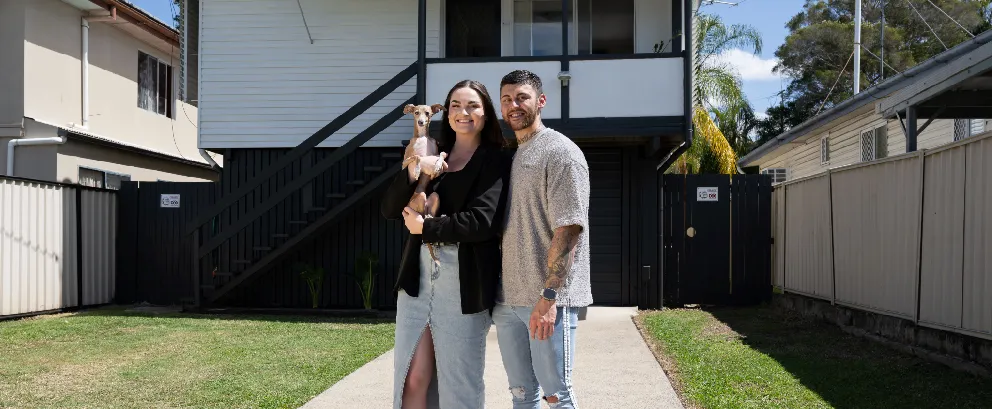Family and friends are Aussies’ top choice for clever financial tips

10 April 2024
Australians are seeking out help to become savvy with their finances – and it’s trusted family and friends that are the most relied on to share their wisdom ahead of financial professionals.
The ‘Clever’ phase of the No Place Like Home report prepared by Great Southern Bank found for Millennials and Gen Z*:
- Less than one-quarter have a current financial plan prepared by a qualified expert;
- Gen Z and Millennials overwhelmingly relied on family (43 per cent and 38 per cent respectively) and friends (31 per cent and 29 per cent) for financial advice during the past year;
- Most had not consulted a qualified professional in the past year – around one in five had seen an accountant, a similar number had talked to their current bank and only one in 10 had been to a financial adviser.
These generations also acknowledged they had more to learn around managing money, rating their financial knowledge an average of 6.1 and 6.5 respectively (out of 10) on the Happily Clever After sentiment tracker. The most financially knowledgeable age group, Baby Boomers, rated themselves an average of 7.0.
Megan Keleher, Chief Customer Officer at Great Southern Bank said: “The second phase of our No Place Like Home report shows that Australians are seeking out ways to be clever with their money in this challenging economic environment.
“Turning to family and friends may be a great place to start in increasing your financial knowledge and it doesn’t need to end there. Jumping on a bank’s website and using a budget planning calculator or a savings tool could be an easy next step to becoming more financially savvy, before potentially talking to your bank, a mortgage broker or another qualified expert.
“The more advice you seek out, the more equipped you’ll feel to make the big financial decisions in life – whether it is starting your savings journey, taking out a car loan or buying a home.”
‘FOMO’ being felt by young Australians, who often need financial help
Faced with increasing house prices and higher interest rates, the research also shows younger generations are often seeing home ownership as a race to the finish line. In fact, 30 per cent of Millennials admitted to buying a property due to a “fear of missing out”.
They are also increasingly reliant on family to buy a home, with Millennials three times more likely than Baby Boomers to have called on parents for financial support.
Generation | Needed financial help from parents to buy their first home |
|---|---|
Gen Z | 32% |
Millennials | 36% |
Gen X | 20% |
Baby Boomers | 11% |
Almost all Millennials (96 per cent) feel they could have done things differently when it comes to their finances, including:
- 72 per cent wish they had made more regular contributions to savings over time;
- 69 per cent wish they had set up savings habits when they were still at school;
- 41 per cent wish they had obtained independent financial advice before major decisions;
- 59 per cent wish they’d researched more before purchasing an investment property;
- Two-thirds wish they’d not splashed as much cash on entertainment.
Gender gap in cost-of-living concerns
The latest No Place Like Home report also shows women of all ages are more likely to have challenging economic conditions on their mind and are tightening their belts accordingly.
Almost 80 per cent of women are concerned about the cost-of-living, compared to 68 per cent of men - and similarly, they are more concerned about housing affordability and interest rates. This is driving women to make more cutbacks on everyday purchases than men:
Type of spending | Women - % who are reducing spending | Men - % who are reducing spending |
|---|---|---|
Entertainment, takeaway/ home delivery, eating out | 64% | 53% |
Groceries, fresh food | 50% | 37% |
Beauty treatments | 48% | 17% |
Holidays | 46% | 42% |
Subscriptions | 40% | 36% |
“We know Australians are feeling cost-of-living pressures, regardless of gender. However, the research shows that women are taking a more proactive approach to reducing spending and being savvy around their money management,” Ms Keleher said.
“Even though it might feel like costs are only headed in one direction, it’s great to see people still finding ways to save – and if you talk to your bank, there are always options to get yourself back on track financially if that’s what you need.”
Click here to learn more about the insights from the ‘Clever’ wave of the Great Southern Bank No Place Like Home research report.
* Generation Z were born 1995-2009; Millennials were born 1980-1994; Generation X were born 1965-1979; Baby Boomers were born 1946-1964.

